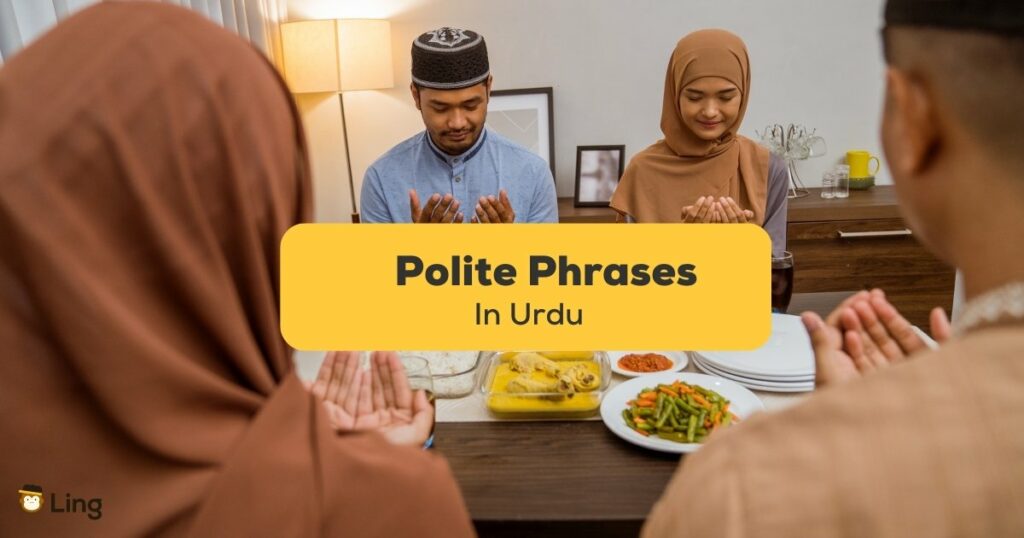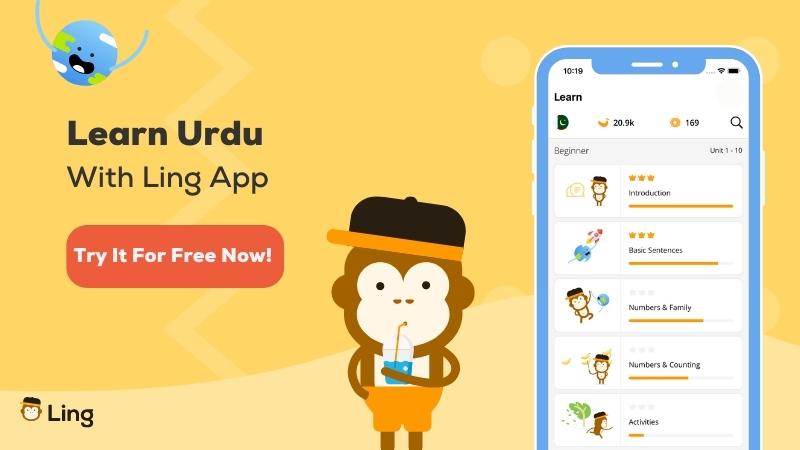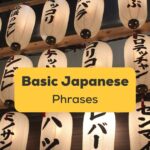Are you struggling to enhance your Urdu language skills? Don’t worry. Every language learner feels the same at some point due to the lack of resources or proper guidance. However, such instances should not be a demotivating factor in your learning journey. Urdu is indeed a very complicated language with unique alphabets that requires more than just greeting words to understand its core. So, persistent training and regular practice is the only way that you can become a full-fledged Urdu speaker.
Thus, we bring to you some polite Urdu phrases like آپ کیسے ہو؟- How are you, مجھے معاف کر دو- Pardon me, etc., that will keep your training on track and give you a clear understanding of the common vocabulary in Urdu used daily by the local people.
Since Pakistan is a very religious and cultural country, it is necessary to understand its nature and behavior. The locals are extremely polite and generous people, which demands you to reciprocate in the same manner. Hence, learning some polite phrases will not just help you improve your Urdu speech but also avoid unwanted situations once you land in the country.
If you think you are interested to learn Urdu, continue reading!
The Body Language Of Islamic Culture
Before we head on with the polite phrases that will help you blend with the locals respectfully, it is important to have a quick peek at some norms of the Islamic culture followed in Pakistan.
The most respectful and traditional way of greeting someone in Pakistan is by wishing السلام علیکم- Assalamu alaikum, which says “peace be upon you.” During this greeting, the person usually takes their right hand forward with the palm inward in front of the face and does a slight bow with the head. In response, the other person is expected to say وعلیکم السلام- Wa alaikum salaam, meaning “and unto you peace.”
Usually, when women greet each other, they kiss on the cheek 2-3 times and hug. Shaking hands are also common among women when they meet. However, if you are completely unknown to the individual, you should avoid physical touch at the first instance. Instead, you can go for a smile and a nod.
When men greet each other, they usually shake hands and hug each other. However, when a man and woman are greeting each other, it is better to maintain distance. The opposite sex is not allowed to hug or kiss each other. Instead, they should follow the hand gesture with a smile. There is also a certain amount of distance that a man is required to maintain from women to be called a gentleman. So, be careful once you reach the country.
Another common rule in Islamic families is that if a non-family member is willing to talk to a married woman, they must first address the woman’s husband. Likewise, a woman is allowed to address only the married woman first, and then the husband gets introduced by the wife. In fact, men and women are also not allowed to make eye contact if they are not closely related. Not following these can make you seem rude.

Polite Urdu Phrases
Now we will talk about all the polite phrases that will help you converse respectfully with the locals. These are simple phrases that are easy to learn, and you should keep them saved in your memory. In case you already know them, practice for better fluency.
1. How Are You?
Translation: آپ کیسے ہو؟
The first thing you need to do when you meet someone is to greet them by saying Assalamu alaikum, followed by Aap kaise hain? Although Pakistani people speak English to a good extent, it is always more respectful and polite to understand their native language and culture. Moreover, to be caring and generous at heart, you must always show your concern whenever you meet someone and ask them about their health.
The most thoughtful way to reply to such a question when asked is to say میں ٹھیک ہوں- Mein theek hon (I am good).
2. Thank You
Translation: شکریہ
Another polite phrase that you should keep saved no matter where you travel is Shukriya. In any situation where you find it fit, you should make use of this phrase. It can be used when a favour is being done, when someone helps you out, or when you receive a compliment or gift from someone.
While it is not very common for locals to say thank you at every instance, as a newcomer, it is only polite to be more careful and use such expressions. Being too prideful can make you sound rude, and the locals might take it as disrespect.
3. I’m Sorry
Translation: میں معافی چاہتا ہوں
Just like the previous phrase, another very important expression you cannot skip is Mein maffi chahta hon. Whether you mistakenly hurt someone, ask for a favor at urgent times, or need to interrupt someone when they are talking, never forget to use such phrases. Especially when you want someone to excuse you in the middle of something, you can politely ask so by being generously sorry first.
Since Pakistani people are very religious, make sure that you apologize whenever they seem offended. Being in a new country, you never know when you might offend someone with a joke or silly statement. If you keep this phrase in mind, you will surely be able to tackle unwanted situations.
4. Excuse Me
Translation: معاف کیجئے گا
Similar to the previous Urdu words, Maaf kijiyej ga is something that you can use when you want to excuse yourself in some situation. It can be while walking past someone, getting up from the table, or even when calling someone. It is a polite way of borrowing someone’s time when they are busy with other work. It means that you are sorry for taking their time. The locals will surely appreciate your courteous behaviour.
5. Please
Translation: برائے مہربانی
Baraye meharbani is a widely spoken phrase even in the western world. It is the same in Pakistan and is a sign of polite manners. Pakistani people appreciate when you use such phrases while asking for help. Not using this can make your favor sound like an order and might upset the locals. Other than that, there are many scenarios when you can use this phrase such as while using transport, ordering food, requesting the bill, or even asking for something. It is a sign of generosity when you seem to be asking and not ordering people. Especially when you talk to elders, keep this phrase at the tip of your tongue.
6. Pardon Me
Translation: مجھے معاف کر دو
Whenever there is an instance where you fail to understand what the other person is trying to convey, you can politely ask them to repeat by saying Mujhe maaf kar do. Although locals do not use such phrases quite often, you must do. Especially being new to the native language, there will be situations where you might fall victim to the language barrier. Thus, to tackle the problem without being rude, use this phrase, and the person will surely repeat it without any issues.
7. May I Help You?
Translation: کیا میں آپ کی مدد کرسکتاہوں؟
Another way of behaving politely is by asking someone Kya mein aap ki madad krsktahon? Pakistani people are very helpful and sometimes they would like to get some help as well. However, it can seem offensive if you try to help without their consent. So, the best way to put forward a helping hand is by using this phrase. Once the other person feels right to take your help, don’t hesitate and provide your assistance. This will surely give a good impression of your personality.
8. Nice To Meet You
Translation: آپ سے مل کر خوشی ہوئی
When you meet someone, be it for the first or in a long time, never forget to express how nice it was to meet them. Making someone know the worth of their existence can bring a smile brighter than you know. So, whenever you meet someone, always say Aap se mil kar khushi hui and make their day better. It is also a common greeting phrase that you must keep saved up your sleeves. It is polite and will help you make friends on the first day itself.

More Polite Phrases To Try Out
Here is a list of more phrases that you would want to try with your Urdu friends. Just read them thoroughly and use them whenever you see fit.
| English | Urdu | Pronunciation |
| Good morning/ Good night | صبح بخیر/ شب بخیر | Subah bakhair / shab bakhair |
| No thanks | نہیں شکریہ | Nahi shukriya |
| I ate well | میں نے خوب کھایا | Mein ne khoob khaya |
| Congratulations to you | آپ کو مبارک ہو | Aap ko mubarak ho |
| Sleep well | اچھی طرح سونا | Achi terhan sona |
| Just a moment | بس ایک لمحہ | Bas aik lamha |
| No problem | کوئی مسئلہ نہیں | Koi masla nahi |
| See you later | بعد میں ملتے ہیں | Baad mein mlitay hain |
| You’re welcome | خوش آمدید | Khush aamdeed |
| Can you please help me? | کیا آپ میری مدد کر سکتے ہیں؟ | Kya aap meri madad kar satke hain? |
| You look gorgeous/ good | تم خوبصورت/اچھی لگ رہی ہو۔ | Tum khobsorat |
| I would love to meet again | میں دوبارہ ملنا پسند کروں گا۔ | Mein dobarah milna pasand karoon ga |
| You are amazing | آپ حیرت انگیز ہیں | Aap herat angaiz hain |
| How are you doing? | آپ کیسے ہیں؟ | Aap kaisay hain? |
| Get well soon | جلدی اچھے ہو جاؤ | Jaldi achay ho jao |
| Are you okay? | کیا تم ٹھیک ہو؟ | Kya tum theek ho? |
| Goodbye | خدا حافظ | Kkhuda Hafiz |
Wrapping Up!
So there you go. Now you know all the polite phrases in the Urdu language that will help you build a good impression in front of the locals. Learning these words has also increased your vocabulary and enhanced your Urdu communication skills. However, if you want to proceed further and learn Urdu or other languages before your next vacation, download the Ling app now!
Ling is one of the best language-learning apps that have content in over 60+ languages, with proper translations. It hires expert writers who provide posts on different topics such as food, school, business, and many more, along with native speakers who record audio.
The best part of the app is the AI chatbot that provides interactive lessons to enhance conversational skills and bring fluency in speech. If you are interested to learn more, download the app from App Store or Play Store now, get your free lifetime account, and start learning Urdu!




































































